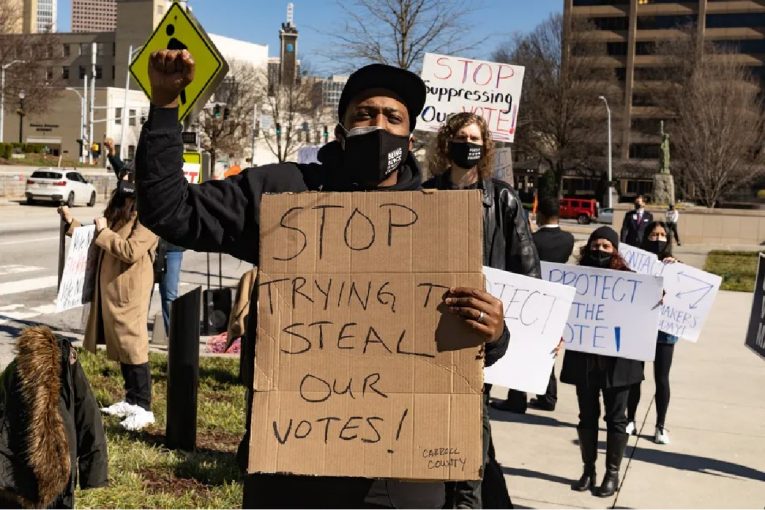

By Ankita Joshi and Max Kennedy
ATLANTA, GA – The ACLU has filed a lawsuit challenging multiple provisions of SB 202, a state law signed by Gov. Brian Kemp of Georgia that places numerous restrictions on voting in the state.
According to civil rights groups, this law will make voting more challenging for all Georgians, and particularly for voters of color, new citizens, and members of religious communities.
The ACLU filed the suit for a broad coalition of civil rights groups, including the Sixth District of the African Methodist Episcopal Church, the Georgia Muslim Voter Project, Women Watch Afrika, Latino Community Fund Georgia, and Delta Sigma Theta Sorority, Inc.
During the 2020 election and the subsequent 2021 runoff elections, Georgia experienced record voter turnout, with especially high turnout of Black voters—an often marginalized group of voters who have long been subject to targeted voter discrimination laws.
Overall, about 25 percent more Georgians voted in 2020 than 2016, and many Georgia officials celebrated the turnout and integrity of the elections.
Some critics of the new law believe this higher turnout—not election security—is the driving motivation behind these new voter restrictions
“Legislators and Governor Kemp ignored the very obvious lessons from the election in 2020 and runoffs in 2021: expand safe and secure access to the ballot, codify innovations to voting, and provide additional resources to cash-strapped counties,” said Nancy Abudu, deputy legal director for the SPLC (Southern Poverty Law Center).
She added, “The defendants have violated federal law and the U.S. Constitution, and we turn to the federal courts and U.S. Congress to address the incredible harm S.B. 202 will have on our clients.”
The lawsuit filed by the ACLU contends that multiple provisions in Law S.B. 202 violate Section 2 of the Voting Rights Act, and also infringe upon protected rights under the First, Fourteenth, and Fifteen Amendments.
Some of the provisions being challenged include a ban on mobile voting, new identification requirements for absentee ballots, a delayed and compressed time period for requesting absentee ballots, restrictions on secure drop boxes, out-of-precinct provisional ballot disqualification, a drastic reduction in early voting in runoff elections, and a ban on “line warming.”
“Line warming” includes providing water and snacks to voters, often those of color, who wait in long lines to cast their ballots. SB 202 makes this practice illegal, generating speculation about the motives behind the new law.
Sophia Lakin, Deputy Director of the ACLU’s Voting Rights Project, believes the law is intended to suppress black votes.
“This law is driven by blatant racism, represents politics at its very worst, and is clearly illegal,” said Lakin. “We urge the court to act swiftly to strike it down,” Lakin said.
She opined that these new restrictions and bans make it harder for marginalized communities to participate in the political process, and have resulted in outrage from many civil rights groups and organizers.
“SB 202 attacks the most sacred foundations of our democracy. But in this country, the law secures every American citizen the equal right to make their voice heard at the ballot box, no matter who they are. And we intend to vindicate that right in court,” said Adam Sieff, attorney at Davis Wright Tremaine, LLP, a San Francisco law firm.

To sign up for our new newsletter – Everyday Injustice – https://tinyurl.com/yyultcf9
Support our work – to become a sustaining at $5 – $10- $25 per month hit the link:
Others see this as a Voter Integrity Law in Georgia
You can ‘put lipstick on a pig, but…’